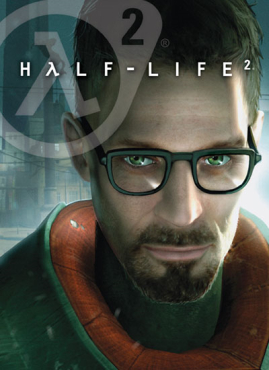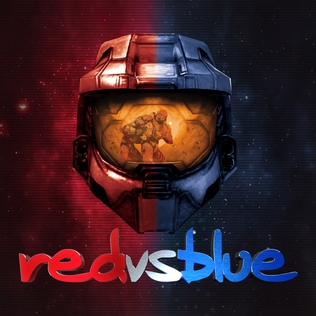
Machinima, originally machinema, is the use of real-time computer graphics engines to create a cinematic production. The word "machinima" is a portmanteau of the words machine and cinema. According to Guinness World Records, machinima is the art of making animated narrative films from computer graphics, most commonly using the engines found in video games.

Half-Life is a 1998 first-person shooter (FPS) game developed by Valve Corporation and published by Sierra Studios for Windows. It was Valve's debut product and the first game in the Half-Life series. The player assumes the role of Gordon Freeman, a scientist who must escape from the Black Mesa Research Facility after it is invaded by aliens following a disastrous scientific experiment. The gameplay consists of combat, exploration and puzzles.

Half-Life 2 is a 2004 first-person shooter (FPS) game developed and published by Valve Corporation. It was published for Windows on Valve's digital distribution service, Steam. Like the original Half-Life (1998), Half-Life 2 combines shooting, puzzles, and storytelling, and adds new features such as vehicles and physics-based gameplay. The player controls Gordon Freeman, who joins a resistance to liberate Earth from the alien Combine empire.
Source is a 3D game engine developed by Valve. It debuted as the successor to GoldSrc in 2004 with the releases of Half-Life: Source, Counter-Strike: Source, and Half-Life 2. It is most well-known for its usage by Valve, but the engine has been used both by small teams and individuals to create modifications of Valve games, and other studios creating distinct games, notably Troika Games' title Vampire: The Masquerade – Bloodlines. Valve continued to create incremental updates to the Source engine after its 2004 release, most of which coincided with games created by Valve. In the late 2010s, Valve created the Source 2 engine to replace Source, with it publicly debuting alongside Half-Life: Alyx. The Source engine is most well-known for its advancements in physics, AI, and graphics.

Red vs. Blue, often abbreviated as RvB, is an American web series created by Burnie Burns with his production company Rooster Teeth. The show is based on the setting of the military science fiction first-person shooter series and media franchise Halo. It is distributed through Rooster Teeth's website, as well as on DVD, Blu-ray, and formerly on the El Rey Network and Netflix. The series initially centers on two opposite teams fighting in an ostensible civil war—shown to actually be a live fire exercise for elite soldiers—in the middle of Blood Gulch, a desolate box canyon, in a parody of first-person shooter video games, military life, and science fiction films. Initially intended to be a short series of six to eight episodes, the project quickly and unexpectedly achieved significant popularity following its premiere on April 1, 2003. The series consists of eighteen seasons and five mini-series. Red vs. Blue is the second longest-running animated webseries of all time, behind Homestar Runner. The series will conclude with the feature-length movie Red vs. Blue: Restoration which is set to be released on May 7, 2024.
A first-person shooter engine is a video game engine specialized for simulating 3D environments for use in a first-person shooter video game. First-person refers to the view where the players see the world from the eyes of their characters. Shooter refers to games which revolve primarily around wielding firearms and killing other entities in the game world, either non-player characters or other players.

Day of Defeat: Source is a team-based online first-person shooter multiplayer video game developed by Valve. Set in World War II, the game is a remake of Day of Defeat. It was updated from the GoldSrc engine used by its predecessor to the Source engine, and a remake of the game models. The game was released for Microsoft Windows on September 26, 2005, distributed through Valve's online content delivery service Steam. Retail distribution of the game was handled by Electronic Arts.

Michael Justin "Burnie" Burns is an American actor, writer, producer, comedian, host, and director previously based in Austin, Texas. He is a co-founder, former chief executive officer, and former chief creative officer of Rooster Teeth. He is noted for his contributions in machinima, a form of film-making that uses video game technology in its production, and also works with animation and live action. Burns is also known for his work in the hosting and podcasting field.
Kuma\War is a tactical shooter game created by developer Kuma Reality Games. Kuma\War is an episodic game that re-creates real-world conflicts in video game format using information culled from news accounts, military experts, Department of Defense records and original research. Episodes consist of a playable mission, extensive background text, and often include interviews with military experts, soldiers and other actual participants in the events described.
An episodic video game is a video game of a shorter length that is commercially released as an installment to a continuous and larger series. Episodic games differ from conventional video games in that they often contain less content but are developed on a more frequent basis.

Half-Life 2: Episode Two is a 2007 first-person shooter game developed and published by Valve. Following Episode One (2006), it is the second of two shorter episodic games that continue the story of Half-Life 2 (2004). Players control Gordon Freeman, who travels through the mountains surrounding City 17 to a resistance base with his ally Alyx Vance. Like previous games in the series, Episode Two combines shooting, puzzle-solving and narrative elements, but adds expansive environments and less linear sequences.

Half-Life is a series of first-person shooter (FPS) games created by Valve. The games combine shooting combat, puzzles and storytelling.

Dogfights is a military aviation themed TV series depicting historical re-enactments of air-to-air combat that took place in World War I, World War II, the Korean War, and the Vietnam War, as well as smaller conflicts such as the Gulf War and the Six-Day War. The program consists of former fighter pilots sharing their stories of actual dogfights in which they took part, combined with computer-generated imagery (CGI) to give the viewer a better perspective of what it is like to engage in aerial combat.

Kuma Games is an American video game developer, specializing in developing free episodic and first-person shooters (FPS) since 2004. The company has also created a number of machinima movies for their games, particularly The Dinohunters.

A gravity gun is a type of device in video games, particularly first-person shooters using physics engines, whereby players can directly manipulate objects in the world, often allowing them to be used as projectiles against hostile characters. The concept was popularized by the gravity gun found in Valve's Half-Life 2, as well as the Temporal Uplink found in Free Radical Design's TimeSplitters: Future Perfect; although a similar concept was used by id Software during the production of the earlier game Doom 3, eventually leading to the introduction of a physics-based weapon in the expansion pack Resurrection of Evil. Later games, such as Portal, BioShock, Crysis, Dead Space, and Garry's Mod have been influenced by the success of these physics-based weapons, adopting their own styles of comparable abilities or weapons.

Freeman's Mind is a machinima series created by Ross Scott using the Source remake of the 1998 video game Half-Life. It follows the protagonist of the game, Gordon Freeman, also voiced by Scott, who acts as a combination of narrator and running commentary, often criticizing and satirizing the game world's conventions in a style similar to that in Mystery Science Theater 3000. The series ran from 2007 to 2014 and consists of 71 episodes, also host to Machinima unit 2014. A sequel series, titled Freeman's Mind 2, debuted in 2017, and is ongoing with 18 total episodes as of December 2023. In total 89 episodes exist across both series.
Based on Id Software's open stance towards game modifications, their Quake series became a popular subject for player mods beginning with Quake in 1996. Spurred by user-created hacked content on their previous games and the company's desire to encourage the hacker ethic, Id included dedicated modification tools into Quake, including the QuakeC programming language and a level editor. As a game that popularized online first-person shooter multiplayer, early games were team- and strategy-based and led to prominent mods like Team Fortress, whose developers were later hired by Valve to create a dedicated version for the company. Id's openness and modding tools led to a "Quake movie" community, which altered gameplay data to add camera angles in post-production, a practice that became known as machinima.











